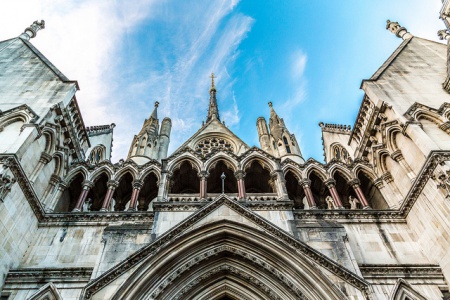Care Not Killing is an established and experienced contributor to the judicial battle on assisted suicide and euthanasia, having intervened at the Court of Appeal and Supreme Court in Nicklinson et al, and at the Supreme Court in 'Y'. Last summer, we intervened again at the High Court when Mr Noel Conway sought a judicial review of the compatibility of the 1961 Suicide Act with the European Convention on Human Rights, and we did so again in May 2018 when the Court of Appeal considered a further bid to overturn the prior ruling and with it legal protections concerning assisted suicide. Care Not Killing's expert evidence was referred to throughout the hearing, and is reflected in the judgment, published today:
72. In addition to the two parties, we granted permission by order dated 17 April 2018 for three organisations to intervene in this appeal, all of which had also intervened in the Divisional Court proceedings...
75. The third, Care Not Killing ("CNK"), also argued for the dismissal of the appeal. CNK is an alliance of individuals and about 20 organisations interested in disability, human rights, health care, and palliative care. One of their core aims is to ensure that existing laws against euthanasia and assisted suicide are not weakened or repealed.
[...]
160. There is evidence of the potential for indirect coercion or undue influence if assisted suicide is permitted. This was a matter particularly emphasised by Ms Catherine Casserley, counsel for NDYUK, and Mr David Lawson, counsel for CNK. The RCGP Report, for example, expressed concern that the "right to die" could very easily become a "duty to die", especially when financial considerations were a factor and the individual felt like a burden to their family. The APM Report said that coercion, real or imagined, may be undetectable and feeling burdensome is a prominent and rising reason for requesting assisted suicide. It also observed that a sense of being a burden can be felt or projected subconsciously and then expressed by either the person or their carer as a genuinely felt belief about the state of affairs.
Care Not Killing also commissioned a report on palliative care to submit to the court:
143. Professor Robert George, a professor and consultant physician in palliative care, has written an expert report on behalf of CNK, in which he has given evidence of error in the medically certified cause of death in 16%-20% of cases. He has also said that individual prognostication, even in diseases such as cancer, is at best an estimate: in patients with multiple and potentially fatal co-morbidities prognosis is altogether unstable, and uncertainty for all diagnoses continues even to the last days of life.
Professor George - Consultant in Physician Palliative Care at Guy's and St Thomas' Foundation Trust, Honorary Professor of Palliative Care at King's College London and a former President of the Association for Palliative Medicine - 'is a clinical academic, rather than researcher' with 'over a hundred publications ranging across medical ethics, law and care modelling. Whilst he has an international reputation as a clinical innovator and thinker, he remains a full-time clinician working between Guy's and St Thomas' Hospitals and its integrated local community palliative care service in Lambeth, Southwark and Lewisham.'
Judges Sir Terence Etherton, Sir Brian Leveson and Lady Justice King cite his evidence a number of times:
162. Dr Hicks' work is also mentioned in the expert report of Professor George. He stated that coercion is very subtle, from overt pressure and malicious encouragement, through subtle suggestion (not necessarily malicious but deriving from, for example, care fatigue), to internalised misplaced feelings by the patient of being a burden on the family. He said that detecting coercion depends crucially on the relationship and a working knowledge of a person's family or forensic objectivity, a characteristic that is not routinely part of doctors' training. That is a problem that would be accentuated if a significant number of doctors refused to engage with assisted suicide and significant doctor-shopping resulted.
[...]
176. We agree with Butler-Sloss and Hoffmann LJJ in Bland at 823H-824A and 831F that an objectively clear line exists in law and fact at the moment between, on the one hand, an act or omission which allows causes already present in the body to operate and, on the other hand, the introduction of an external agency of death: and see Lord Goff in the House of Lords at 864-866, 868 and 873, and Lord Bingham in Pretty at 813E. The evidence of the views of professional medical associations shows that this is a line which their members also find to be clear. It is a concern that, if the clear line which currently exists between suicide, on the one hand, and assisted suicide and euthanasia, on the other hand, is moved by the legalisation of assisted suicide, it might make the different legal treatment of assisted suicide and euthanasia very difficult to maintain. This is a problem which emerges clearly from the evidence of Professor Finlay, Professor George and the APM Report.
177. Another matter to be placed in the balance is the advance made in palliative care in recent years. There is expert evidence from Professor Christina Faull, a palliative medicine consultant, and Professor George as to the ability of modern palliative medicine better to assist those suffering from MND towards the end of their life, and in particular to prevent and manage breathlessness and distress, including when the time comes for NIV to be withdrawn.
178. All those matters raise wide-ranging policy issues.
We, Care Not Killing, are grateful to Professor George and to our legal team, especially barrister Davis Lawson of Serjeants' Inn and solicitor David Lawson of Barlow Robbins, for their work on our intervention.
If you would like to support such work, please make a donation to Care Not Killing.
© Image copyright of Dave Pearce and licensed for reuse under Creative Commons License 2.0










